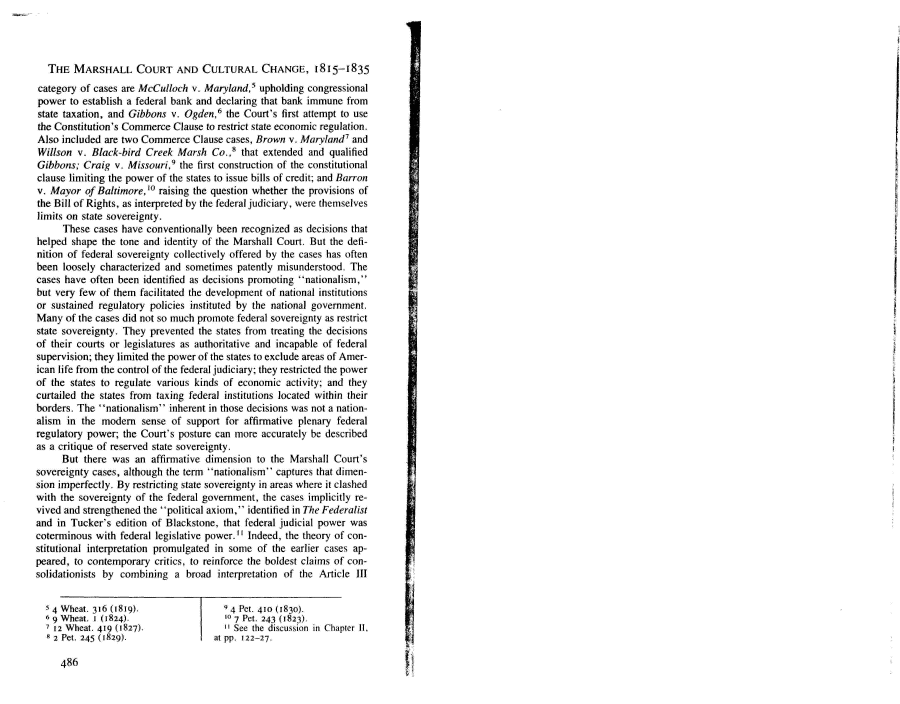|
THE MARSHALL COURT AND CULTURAL CHANGE, 1815-1835
category of cases are McCulloch v. Maryland,5 upholding congressional
power to establish a federal bank and declaring that bank immune from
state taxation, and Gibbons v. Ogden,6 the Court's first attempt to use
the Constitution's Commerce Clause to restrict state economic regulation.
Also included are two Commerce Clause cases, Brown v. Maryland1 and
Willson v. Black-bird Creek Marsh Co.,8 that extended and qualified
Gibbons; Craig v. Missouri,9 the first construction of the constitutional
clause limiting the power of the states to issue bills of credit; and Barren
v. Mayor of Baltimore,10 raising the question whether the provisions of
the Bill of Rights, as interpreted by the federal judiciary, were themselves
limits on state sovereignty.
These cases have conventionally been recognized as decisions that
helped shape the tone and identity of the Marshall Court. But the defi-
nition of federal sovereignty collectively offered by the cases has often
been loosely characterized and sometimes patently misunderstood. The
cases have often been identified as decisions promoting "nationalism,"
but very few of them facilitated the development of national institutions
or sustained regulatory policies instituted by the national government.
Many of the cases did not so much promote federal sovereignty as restrict
state sovereignty. They prevented the states from treating the decisions
of their courts or legislatures as authoritative and incapable of federal
supervision; they limited the power of the states to exclude areas of Amer-
ican life from the control of the federal judiciary; they restricted the power
of the states to regulate various kinds of economic activity; and they
curtailed the states from taxing federal institutions located within their
borders. The "nationalism" inherent in those decisions was not a nation-
alism in the modern sense of support for affirmative plenary federal
regulatory power; the Court's posture can more accurately be described
as a critique of reserved state sovereignty.
But there was an affirmative dimension to the Marshall Court's
sovereignty cases, although the term "nationalism" captures that dimen-
sion imperfectly. By restricting state sovereignty in areas where it clashed
with the sovereignty of the federal government, the cases implicitly re-
vived and strengthened the "political axiom," identified in The Federalist
and in Tucker's edition of Blackstone, that federal judicial power was
coterminous with federal legislative power." Indeed, the theory of con-
stitutional interpretation promulgated in some of the earlier cases ap-
peared, to contemporary critics, to reinforce the boldest claims of con-
solidationists by combining a broad interpretation of the Article III
5 4 Wheat. 316 (1819).
69 Wheat, i (1824).
7 12 Wheat. 419 (1827).
8 2 Pet. 245 (1829).
486
9 4 Pet. 410(1830).
10 7 Pet. 243(1823).
11 See the discussion in Chapter II,
at pp. 122-27.
|

